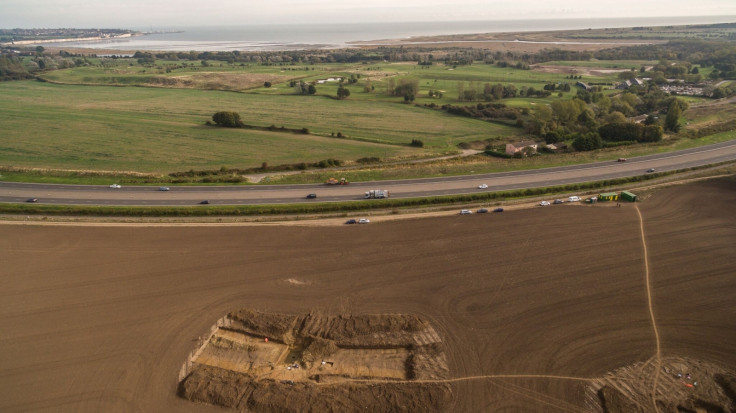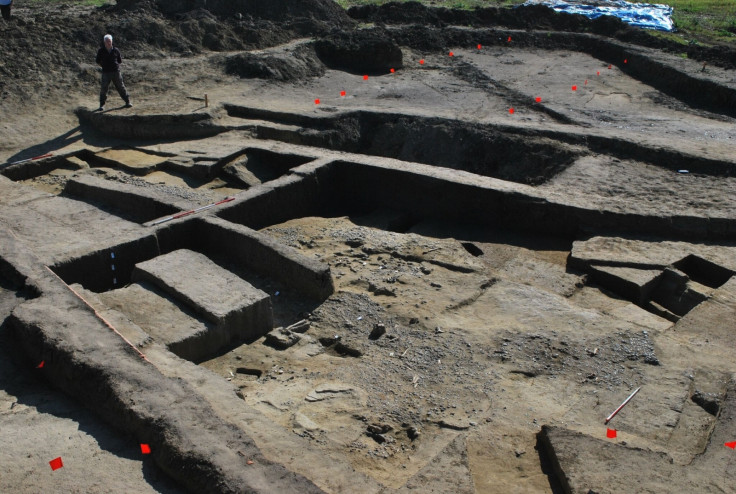First archaeological evidence of Julius Caesar's invasion of Britain discovered
Researchers say Caesar's campaign had more impact on British history than first thought.

Researchers have discovered the first archaeological evidence of Julius Caesar's invasion of Britain suggesting that the Roman emperor's fleet landed at Pegwell Bay on the Isle of Thanet in Kent.
A project by archaeologists from the University of Leicester and Kent County Council found a large defensive ditch at Ebbsfleet in Thanet which resembled Roman defences found elsewhere in Europe. The structure was discovered during excavation works for the building of a new road.
Ebbsfleet, on the northeastern tip of Kent, is now 900 metres inland, but in 54 BC, when Caesar landed, it was much closer to the coast.
The site and the presence of iron weapons, including a javelin, suggest it was a Roman base in the 1st century BC which may have been built to protect Caesar's fleet moored on a nearby beach.
"Thanet has never been considered as a possible landing site before because it was separated from the mainland until the Middle Ages," said Andrew Fitzpatrick, from the University of Leicester's School of Archaeology and Ancient History.
The width of the channel separating Thanet from the mainland – the Wantsum Channel – is not known although Fitzpatrick added that it did not pose a significant barrier to the people of Thanet during the Iron Age. It would certainly not have been a major challenge to overcome for the engineering capabilities of the Roman army, he said.
The topography of the area surrounding the landing site also matches the emperor's own account of what he saw.
"Sailing from somewhere between Boulogne and Calais, Caesar says that at sunrise they saw Britain far away on the left-hand side," Fitzpatrick said. "As they set sail opposite the cliffs of Dover, Caesar can only be describing the white chalk cliffs around Ramsgate which were being illuminated by the rising sun.

"Caesar describes how the ships were left at anchor at an even and open shore and how they were damaged by a great storm. This description is consistent with Pegwell Bay, which today is the largest bay on the east Kent coast and is open and flat.
"The bay is big enough for the whole Roman army to have landed in the single day that Caesar describes. The 800 ships, even if they landed in waves, would still have needed a landing front 1-2km wide."
Caesar also described how native Britons tried to fend off the invasion. They were overwhelmed by the size of the flee, however, and made for higher ground to hide. This account is consistent with the elevated areas of the Isle of Thanet around Ramsgate.
The last comprehensive study of Caesar's invasions was published more than 100 years ago, in 1907.

Scholars have long thought that because the emperor quickly returned to what is now France, the initial invasions were failures and had little lasting effect on the peoples of Britain. It has also been claimed that because his campaigns were short they would have left few, if any, archaeological remains.
400-year rule
The Leicester researchers have challenged these ideas. Caesar's exploits were met with great acclaim in Rome because he had gone beyond the limits of the known world, they argued.
They also claimed that the campaigns shaped the history of Britain more than previously thought and that Emperor Claudius exploited Caesar's legacy when he conducted his more comprehensive invasion of Britain nearly 100 years later in 43AD. That campaign resulted in the Roman settlement of England, Wales, and parts of Scotland for the best part of 400 years.
"It seems likely that the treaties set up by Caesar formed the basis for alliances between Rome and British royal families," said Colin Haselgrove, principal investigator for the project from the University of Leicester.
"This eventually resulted in the leading rulers of southeast England becoming client kings of Rome. The conquest of southeast England seems to have been rapid, probably because the kings in this region were already allied to Rome."





















